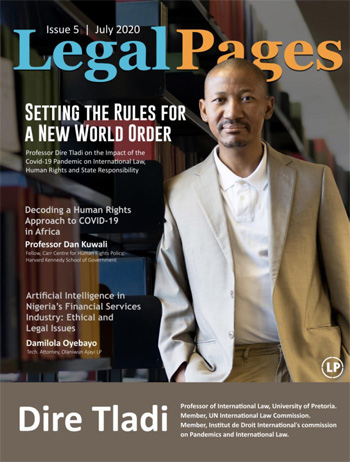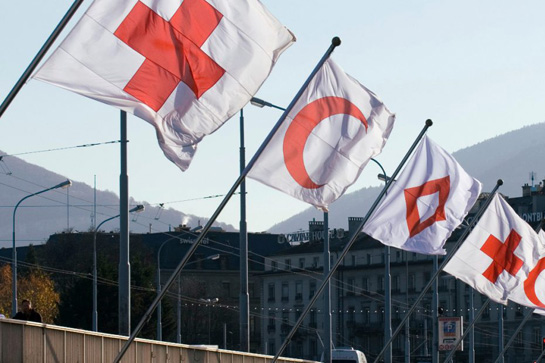
The Pretoria Regional Delegation of the International Committee of the Red Cross together with the Institute for International and Comparative Law in Africa and the Centre for Human Rights of the University of Pretoria will be presenting the eighteenth All Africa Course on International Humanitarian Law between 25 January and 05 February 2021.
The online course is a comprehensive introduction to the law of armed conflict and contemporary issues in International Humanitarian Law (IHL).
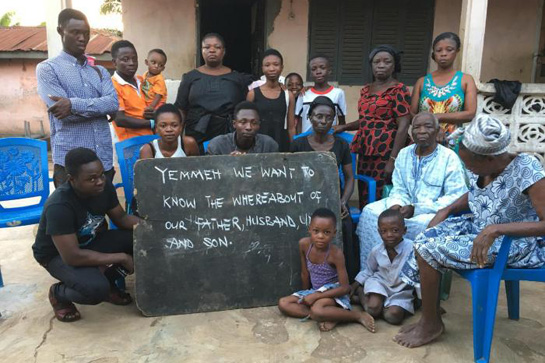
With legal support from the Sterling Centre for Law & Development, the families of West African migrants assisted by ANEKED, filed complaints on November 18 against the governments of Ghana and The Gambia before the ECOWAS Community Court of Justice for infringing several international human rights, including the right to judicial remedies.
In July 2005, in one of the most brazen display of impunity by the Jammeh regime, approximately 44 Ghanaian migrants as well as some 12 other West Africans (from Nigeria, Senegal, Togo, and Côte d’Ivoire) including two women (one reportedly pregnant) were forcibly disappeared in The Gambia while on their way to Europe by sea. A Gambian national, Lamin Tunkara, purported to have been their smuggler also suffered the same fate. The migrants were never heard from again except for one who managed to escape and alert authorities across the border in Senegal.
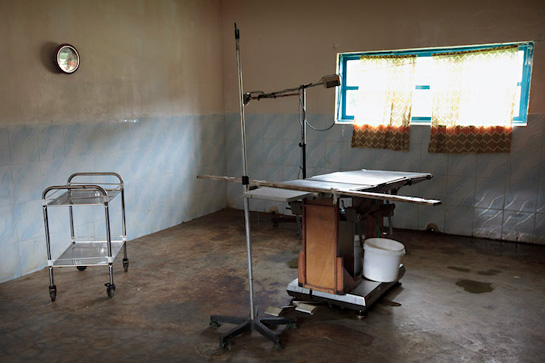
by Christof Heyns, Stuart Casey-Maslen, Thomas Probert
As in any branch of international law, examining the meaning of a law of armed conflict (LOAC) term, and its incorporation in the Rome Statute of the International Criminal Court, should look first to the treaties—and “attack” is no different. Indeed, as is well known, the notion of “attacks” is explicitly defined in Article 49 of the 1977 Additional Protocol I as “acts of violence against the adversary, whether in offence or in defence.” A seemingly broad definition, it is certainly clear and concise. One might thus be tempted to end an inquiry of the law there.
But in this post, we detail why such an approach would be mistaken. For it fails to consider the notion of an “attack” in Geneva Law (which protects persons and objects in the power of the enemy), which applies more broadly than does the Hague Law regulation of the conduct of hostilities. This omission is particularly serious in the context of a non-international armed conflict, where the geographical scope of hostilities is tightly circumscribed.
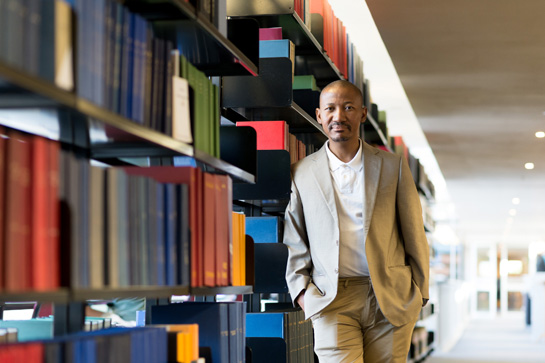
On 17 September 2020, Prof Dire Tladi was appointed to serve as the President of the South African Branch of the International Law Association (SABILA). SABILA is a chapter of the International Law Association (ILA), an organisation that brings together international lawyers from all over the world dedicated to the "study, clarification and development of international law" and the "furtherance of international understanding and the respect of international law".
Tladi has been a member of the ILA and SABILA since 2001 and has served on various of the ILA's committees including its committee on international law and sustainable development.
Tladi replaces Professor Hennie Strydom of the University of Johannesburg as the President of SABIL.
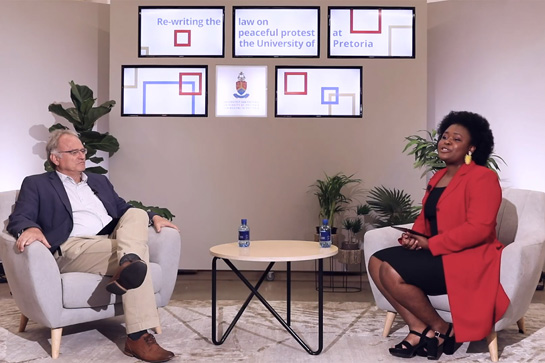
Members of the Freedom from Violence Unit of the Centre for Human Rights, Faculty of Law, University of Pretoria, have for the last five years been leading the process in the United Nations (UN) to develop a coherent set of international standards on the management of demonstrations.
In this video we trace the work Prof Christof Heyns and his team did to help develop General Comment 37 (2020) on the right of peaceful assembly with the UN Human Rights Committee; the UN Guidance on less-lethal weapons of 2020; and the Minnesota Protocol on the investigation of potentially unlawful death of 2015.
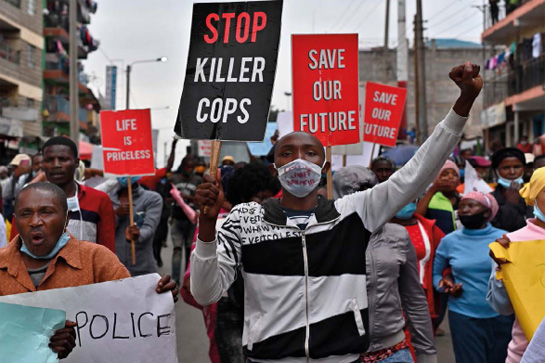
Along with Dr Mutuma Ruteree and Brian Kimari of the Centre for Human Rights and Policy Studies (CHRIPS), Dr Thomas Probert has recently published a study of police oversight arrangements in Kenya. It is based upon research undertaken as part of an EU-funded project implemented by a consortium of partners aimed at ensuring strengthening police oversight and investigations. In addition to CHRIPS and the Centre for Human Rights these partners are the Independent Policing Oversight Authority of Kenya (IPOA), the African Policing Civilian Oversight Forum (APCOF), and the Danish Institute for Human Rights (DIHR).
The study assesses the gaps in the investigations processes undertaken by the Independent Policing Oversight Authority (IPOA) and identifies areas of possible intervention. It builds upon a review of existing studies into police killings in Kenya, the legal framework protecting human rights in the context of policing, as well as more technical documents of both the Kenyan police and of IPOA. Beyond these texts, the study is informed by a series of key informant interviews and a number of focus group discussions in Nairobi, Kisumu, Nakuru, Mombasa, Kwale and Garissa counties.
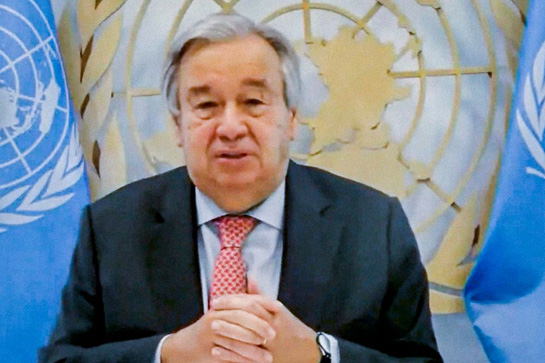
Original post: The Public's Radio
JOHANNESBURG (AP) — In a diminished spotlight because of the COVID-19 pandemic, leading human rights defenders on Friday urged people in these fractured times to connect through politics — and vote, too.
“In many places around the world, participation is being denied and civic space is being crushed,” United Nations Secretary-General Antonio Guterres said on the sidelines of the annual U.N. gathering of world leaders, this year held online.
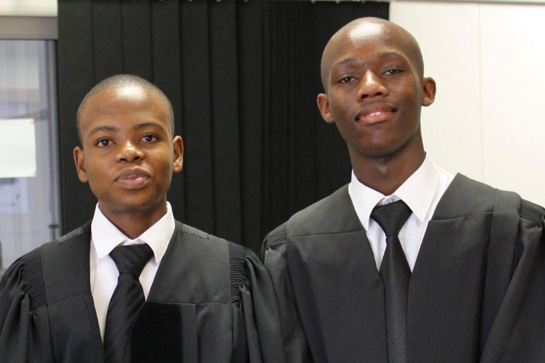
The Faculty of Law (UP Law) at the University of Pretoria (UP) proudly announces and congratulates its alumni, Keketso Gift Kgomosotho and Stanley Malematja, who were recognised by the Mail & Guardian (M&G) 200 Young South Africans. Every year, M&G canvasses the country to find the 200 most outstanding young South Africans. At the beginning of every year, M&G opens up nominations for Young South Africans and this year they received approximately 8 000 nominations.
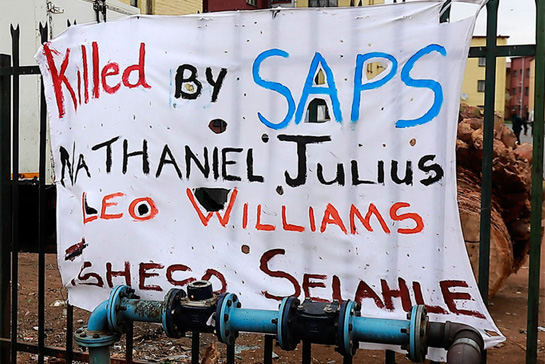
Original post: Maverick Citizen
Two children have died at the hands of police in South Africa during the last week. Both of the children were innocent of any crime.
In the case of 9 year old Leo Williams, who was caught by a stray rubber bullet when police opened fire on protestors during a service delivery protest in St Helena Bay, he was not even involved in the protest action. News reports indicate he was playing indoors when this occurred. The police say Nathaniel Julies, a 16 year old boy with down syndrome, was shot in the crossfire when they opened fire on gangsters. Family members say that he was shot by police when he failed to answer questions. Full investigations by the Independent Police Investigative Directorate will hopefully reveal the full stories. But so far we know enough to say that these were two eminently avoidable deaths. We also know the deaths were caused by the use of force by police involving lethal weapons.
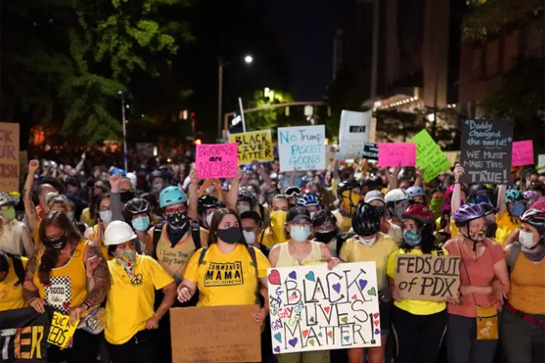
by Martin Scheinin
General Comment No. 37 by the U.N. Human Rights Committee, the treaty body monitoring compliance with the International Covenant on Civil and Political Rights (ICCPR), was released on Wednesday, July 29. As usual, the General Comment is an interpretive document related to one of the human rights covered by the Covenant, in this case the right to freedom of assembly, ICCPR Article 21. Other treaty bodies acting under different U.N. human rights treaties also issue General Comments or General Recommendations, but amongst them, the Human Rights Committee is most faithful to the idea of crafting its General Comments in the form of interpretive commentary of the treaty obligations, flowing from a binding treaty provision while at the same time evolving through institutionalized practices of interpretation. For its General Comments, the Committee primarily relies on its own practice related to the examination of periodic reports by governments or to the quasi-judicial adjudication of complaints by individuals. Increasingly, it also has drawn on a greater variety of sources.
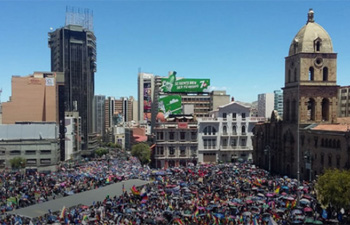
It’s widely accepted that peaceful protests are a key tool in democratic societies that allow people to put issues on the public agenda. But what is legal – and what is illegal – when it comes to demonstrations around the world? Can you wear a mask, for example?
That’s a question for Christof Heyns, who led discussions on the issue for the UN Human Rights Committee, with Member States and NGOs.
In an interview with UN News’s Daniel Johnson, veteran rights expert Professor Heyns explains what the UN panel’s advice is for protesters - and Governments - according to its just-released General Comment on the right to freedom of assembly.
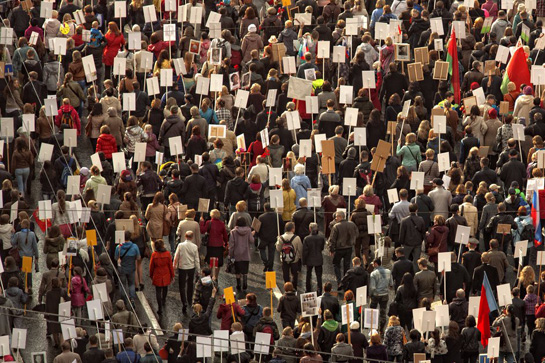
by Priya Pillai
The United Nations Human Rights Committee has adopted General comment No. 37 on the right of peaceful assembly emanating from Article 21 of the International Covenant on Civil and Political Rights (ICCPR). The final document was made available last week, and can be found here.
Professor Dire Tladi in the Department of Public Law and a Fellow at the Institute for International and Comparative Law in Africa in the Faculty of Law at the University of Pretoria futures in Issue 5 of the Legal Pages, July 2020, (page 7 to 12) on ‘The impact of the Covid-19 Pandemic on International Law, Human Rights and State Responsibility.’
The Legal Pages interview with Tladi is based on his appointment to serve on the Institut de Droit’s Commission on Pandemics and International Law. In this article, he shares his professional experience, the multifarious roles of international law in these dire times, and inter alia, his passion for fiction writing. He also has a strong message for law and policymakers across the Africa continent: 'The people of this continent need strong leaders to take them out of the abyss of poverty. Lead for them!'

The United Nations Human Rights Committee last week adopted comprehensive standards on the way in which States should deal with peaceful assemblies. These guidelines are authoritative for the 173 States in the world that have ratified the Covenant on Civil and Political Rights.
The 18-member committee of international experts adopted the General Comment as the culmination of a two-year process. The process was led by Professor Christof Heyns, former Director of the Centre for Human Rights, current Director of the Institute for International and Comparative Law in Africa at the University of Pretoria and a member of the Committee. He was supported by colleagues in the Faculty of Law and a doctoral student from Kenya.
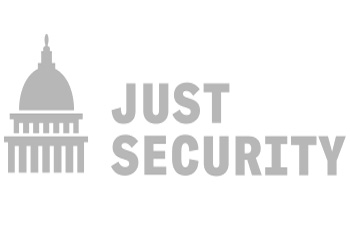
Go to original post on Just Security
World Justice Project Executive Director Elizabeth Andersen is joined by Christof Heyns, Professor of Human Rights Law at the University of Pretoria and member of the United Nations Human Rights Committee, on WJP’s Rule of Law Talk Podcast to discuss the right of peaceful assembly. A new General Comment issued this week by the United Nations Human Rights Committee provides guidance on this topic at a critical moment, with protest movements on the rise across the globe, and many countries grappling with the appropriate response—something that has become even more complicated with the COVID-19 pandemic and public health restrictions on large gatherings.
The audio podcast is available at WJP.
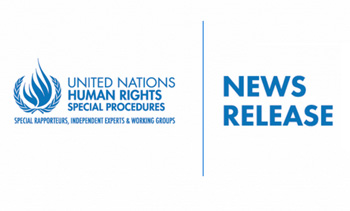
GENEVA (29 July 2020) – The UN Special Rapporteur on the rights to freedom of peaceful assembly and association has hailed as groundbreaking an authoritative new interpretation that the right to peaceful assembly extends to digital activities.
“I am excited by this truly landmark affirmation that protection of the right to peaceful assembly extends to remote participation, including online assemblies,” said Clément N. Voule, reacting to a document released by the UN Human Rights Committee today. “It is particularly relevant during the COVID-19 pandemic, when so many peaceful gatherings have moved online.”
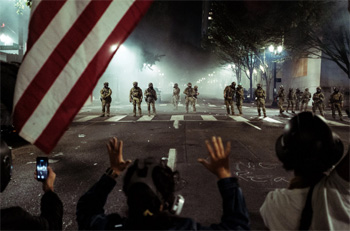
The comments by the United Nations Human Rights Committee come as the Trump administration faces growing criticism for deploying federal agents to confront Black Lives Matter protesters.
GENEVA — Law-enforcement authorities are obligated to protect and facilitate peaceful demonstrations, an influential United Nations human rights panel said on Wednesday, challenging tactics the police have used against anti-racism protests in American cities and around the world.
The international treaty governing civil and political rights requires states to allow peaceful demonstrations, not to block or disrupt them without a compelling reason, the United Nations Human Rights Committee said. Authorities should also seek to de-escalate situations that might lead to violence and to use only the minimum force necessary to disperse crowds.
“A failure to respect and ensure the right of peaceful assembly is typically a marker of repression,” the panel said in its finding.
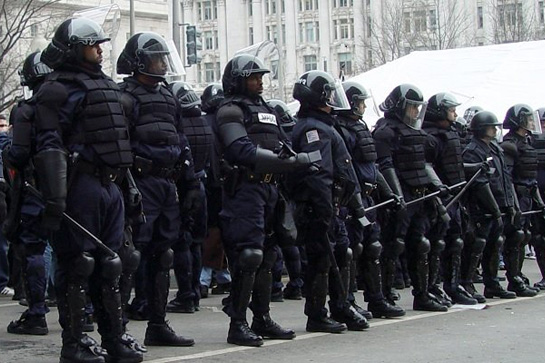
The United Nations in Geneva has released global standards on the use of force by the police worldwide. UN High Commissioner for Human Rights Michelle Bachelet welcomed the new United Nations Human Rights Guidance on the Use of Less-Lethal Weapons in Law Enforcement and urged all states to follow it.
The Guidance sets out the different kinds of weapons that are available to the police today, and identifies the conditions under which they may and may not be used. The High Commissioner thanked the University of Pretoria and the Geneva Academy and in particular Professor Christof Heyns, who teaches at both these institutions and lead the process of drafting the Guidance in collaboration with the UN Office of the High Commissioner for Human Rights.
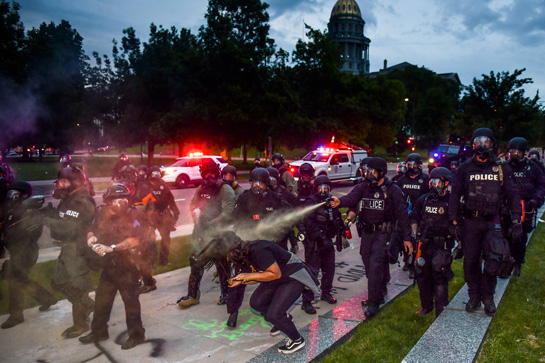
Original post: www.justsecurity.org
The excessive use of force by U.S. police forces in responding to the wave of demonstrations that have taken place throughout the country in the wake of the killings of Ahmaud Arbery, Breonna Taylor, George Floyd, and Rayshard Brooks has rightly been widely condemned. In particular, events in the United States in recent weeks have highlighted the reality that far too often police use of force has a distinct racial bias. In the words of the United Nations High Commissioner for Human Rights Michelle Bachelet, speaking during an urgent debate in the Human Rights Council on racism and excessive use of force in policing on June 17, “Too little has changed over too many years.”
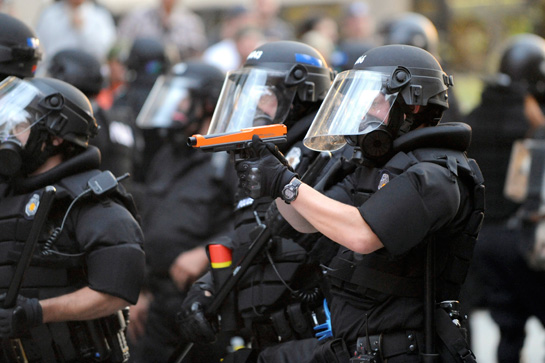
Research from the University of Pretoria’s Faculty of Law has become a global benchmark for a major US-based study on the police’s use of force in America.
In the wake of the deaths at the hand of the police of George Floyd, Laquan McDonald, Eric Garner, Michael Brown, Ahmaud Arbery, Tony McDade, Regis Korchinski-Paquet, Breonna Taylor and many others, the new study was released by the University of Chicago’s Law School.
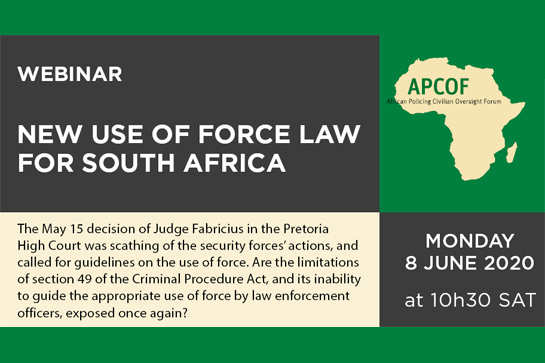
This webinar will discuss use of force legislation in South Africa and whether the time has come to consider a comprehensive new Use of Force Law.
- Louise Edwards – Programmes and Research Director, APCOF
- Adv. Tseliso Thipanyane – Chief Executive Officer, SA Human Rights Commission
- Prof. Christof Heyns – Director of the Institute for International and Comparative Law in Africa, University of Pretoria, and member of the UN Human Rights Committee
- Themba Masuku – Independent Policing Researcher
- Hon. J Jeffery – Deputy Minister of Justice and Constitutional Development South Africa
 Download Invitation
Download Invitation
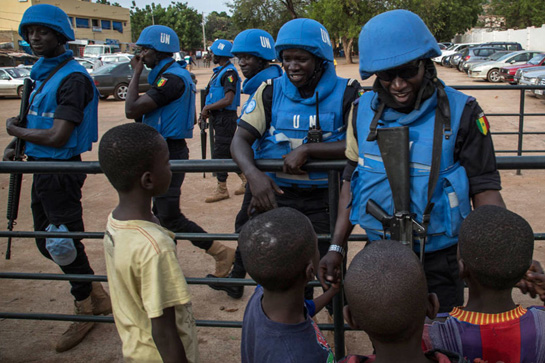
The International Day of United Nations Peacekeepers, commemorated annually on 29 May, is a day dedicated to honouring and paying tribute to men and women who have lost their lives while serving in UN peacekeeping missions, both military and civilians. Peacekeeping has gone through several evolutions since the first peacekeeping mission was created more than 70 years ago. In the time since then, the United Nations Truce Supervision Organization (UNTSO), a peacekeeping mission established in 1949 to monitor the Armistice Agreement between Israel and Arab States, peacekeeping missions, has increased in number and evolved in form.
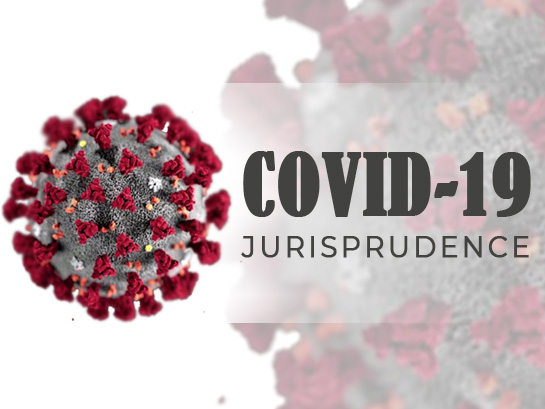
ICLA is preparing summaries of COVID-19-related jurisprudence around the world on the right of peaceful assembly and police use of force.
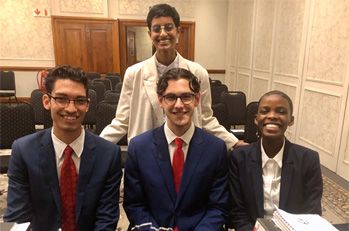
A team of students from the Faculty of Law of the University of Pretoria represented South Africa at the prestigious global rounds of the Jessup International Moot Court Competition that are held in Washington D.C. in April every year. The top law faculties in the world participate every year, and in 2020 more than 700 lined up to show their mettle in what is widely seen as the world championship of law schools.
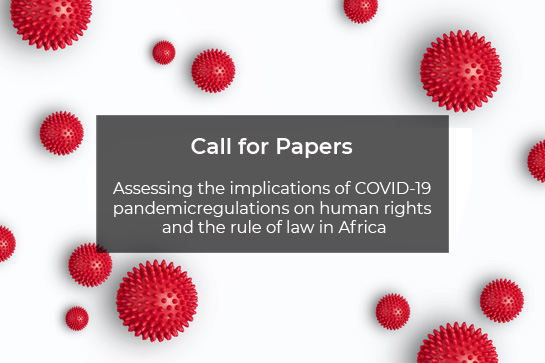
The Institute for International and Comparative Law in Africa and Centre for Human Rights of the University of Pretoria, in partnership with the Konrad Adenauer Stiftung’s Rule of Law Program for SubSaharan Africa - Nairobi, Kenya, is planning a webinar on the theme “Assessing the implications of Covid-19 pandemic regulations on human rights and the rule of law in Africa,” for 11-12 August 2020.
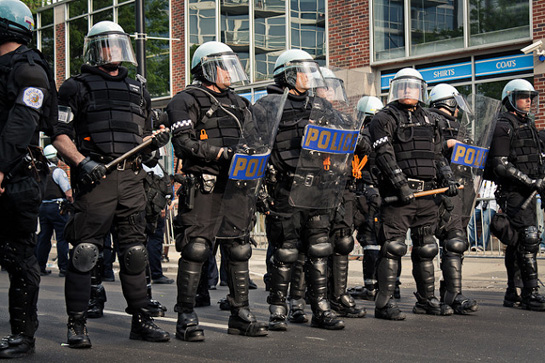
In response to the recent Khoza judgement in the Pretoria High Court on the use of force by law enforcement officials during the Covid-19 pandemic, the Institute for International and Comparative Law in Africa together with the Centre for Human Rights have made available an overview of the main international legal documents and standards on the use of force.
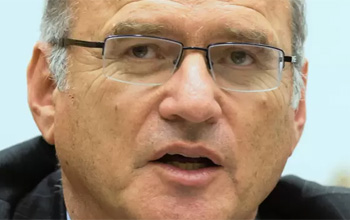
By Lisa Isaacs
Cape Town – The Commission on Human and Peoples’ Rights has appointed the University of Pretoria’s Professor Christof Heyns and some of his colleagues in the Faculty of Law to assist with a continent-wide comparative study on the use of force by law enforcement officials.
They are tasked with collecting all the applicable laws and collaborating with the commission to study how the use of force by law enforcement is dealt with in Africa in the context of the protection of the right to life and UN Sustainable Development Goal (SDG) 16.
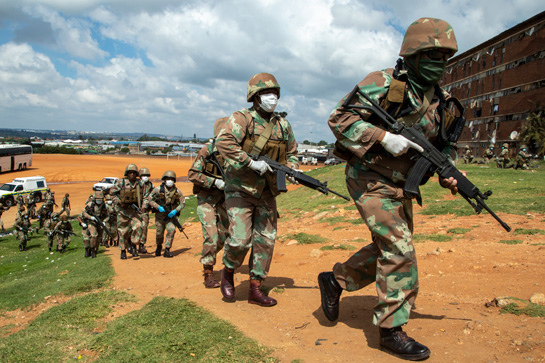
PRETORIA – The human rights body of the African Union, the African Commission on Human and Peoples’ Rights, has appointed Professor Christof Heyns and some of his colleagues in the Faculty of Law at the University of Pretoria to assist with a continent-wide comparative study on the laws related to the use of force by law enforcement officials in all African countries.

The University of Pretoria, working with a global network of research partners (including in Cambridge, Geneva and well-established collaboration with more than a dozen other African universities), recently established a research programme that focuses on violence reduction and securing the right to life in Africa. This is a multi-disciplinary programme that engages in the African context with the aspiration of UN Sustainable Development Goal 16 to establish ‘peaceful societies’.
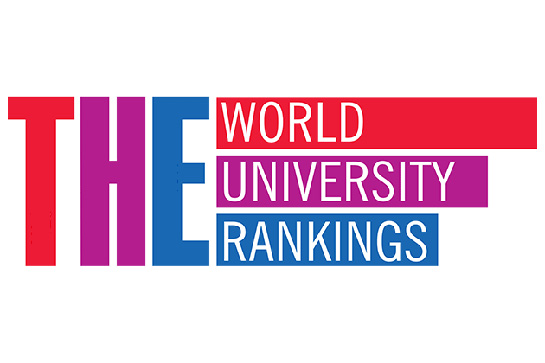
Last week Times Higher Education, one of the most well-regarded global analysts of comparative university performance, announced their global University Impact Rankings, which seek to capture universities’ impact on society based on their success in delivering the United Nations Sustainable Development Goals (SDGs).
The University of Pretoria is proud to have been ranked within the top 100 universities in the world in terms of their impact regarding SDG 16, the goal aimed at reducing violence, pursuing access to justice and building effective institutions.
The score was designed to reflect not only the research undertaken directly related to SDG 16, but also the University’s internal governance procedures, the proportion of its graduates in law and civil enforcement related courses, and its engagement with local, regional and national government policy-making and capacity building. When taken together the University scored 76/100, and was ranked joint 68th (of more than 450 ranked institutions).
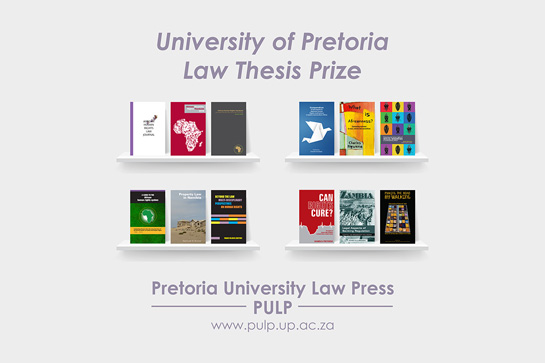
Students who have completed, or will complete, their doctoral studies in law at an African University in 2020 are encouraged to submit their doctoral theses for consideration for the new Pretoria University Law Press Thesis Prize, which will be awarded on an annual basis.
The winning thesis will be published in book form by the Pretoria University Law Press (PULP).
To qualify, the thesis must deal with:
- human rights,
- good governance, or
- social justice as seen from an African perspective, and
- have been successfully examined in 2020.
The criteria used by the panel will be the inherent quality of the research, as well as the relevance of the topic to African challenges and the originality of the approach.
Candidates who have completed their doctoral studies in law during a particular year at an African university (in the sense that it has been successfully examined) are invited to submit their theses for consideration for the annual ‘University Law Press Thesis Prize’ during the following year.

By Thomson Chengeta
This article is part of a series.
The challenges that are raised by lethal autonomous weapon systems [LAWS] – also known as killer robots – remain pertinent today, even amidst the deadly corona virus pandemic that has taken the world by a storm. Realising that even in times of crisis, it is critical for nations to continue addressing this urgent issue, from 1-2 April 2020, the German Government hosted a Berlin virtual forum on the regulation of LAWS within which 450 people participated from 63 countries. During the forum, the German Government – through its Foreign Minister – reiterated that “letting machines decide over life and death of human beings runs against all of our ethical standards”.

The Faculty of Law of the University of Pretoria is proud to announce that Professor Dire Tladi was appointed to serve on the Commission dealing with Pandemics and International Law of the Institut de Droit International, based in Geneva, Switzerland.
The Institut de Droit International is an organization devoted to the study and development of international law, whose membership comprises some of the world's leading public international lawyers. It was awarded the Nobel Peace Prize in 1904. The Institut decided to place the topic of pandemics on its agenda in the wake of Covid-19.
Professor Tladi joins other leading international lawyers, such as former President of the International Criminal Tribunal, Theodore Meron and Judge of the International Court of Justice, Xue Hanqin. Other members of the Commission are Shinya Murase (Special Rapporteur), Gerard Niyungeko, Antony Anghie, Eyal Benvenisti, Claudio Grossman, Bernardo Sepulveda-Amor, Jose Alvarez, Francesco Francioni, Vanda Lamm, Vaclav Mikulka, Fausto Pocar, Antonio Remiro Brotons and Campbell McLachlan.

The Faculty of Law is proud to announce that UP Faculty of Law alumna Aniel de Beer's book on 'Peremptory Norms of General International Law (Jus Cogens) and the Prohibition of Terrorism' has been selected as the winner of the American Society of International Law Francis Lieber Prize for best book in the law of armed conflict. The book is based on De Beer’s doctoral thesis completed in 2018 and prepared under supervision of Professor Dire Tladi in the Department of Public Law and the Institute for International and Comparative Law in Africa, and a member of the International Law Commission.
In the words of Professor Laurie Blank, Director of the Centre for International and Comparative Law and Director of the International Humanitarian Law Clinic at Emory Law School, “[I]t is my great pleasure to inform you that your book has been selected as the winner of the Lieber Prize for best book in the law of armed conflict. Congratulations! The Prize Committee really enjoyed and was very impressed with your book.”
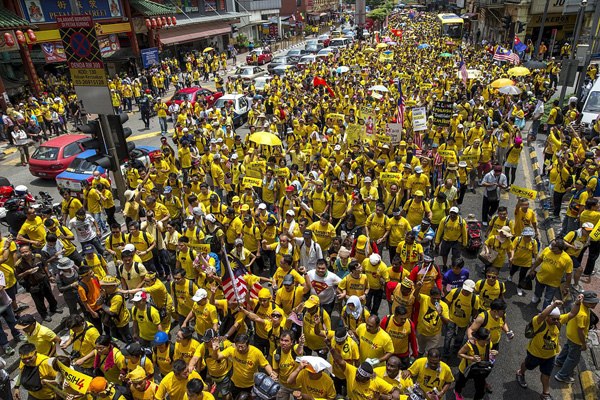
Editor’s note from Ryan Goodman: Just Security is publishing a mini-forum on a significant document being drafted by the United Nations Human Rights Committee concerning the right of peaceful assembly. We are honored to launch the series with this article by Christof Heyns, member of the Committee and its rapporteur on the draft General Comment. As Heyns notes in his article, the Committee is currently accepting public views on the draft document, and we hope this series at Just Security will contribute to the important work of the Committee.
While public demonstrations have been an established part of political life in many parts of the world since at least the early 1900’s, they have more recently become a truly global phenomenon. The year 2019 has been marked by protest actions across the globe.
A number of causes have brought about the increased resort to demonstrations, the most obvious one probably being the increasing ease of communications. This ensures, on the one hand, that people around the world are exposed in real time to the struggles – and often the victories – of protestors in other parts of the world, and at the same time it facilitates the easy mobilization of popular participation in local protest actions. Human rights have also fostered a global sense of individual freedom as something worth taking a stand for.
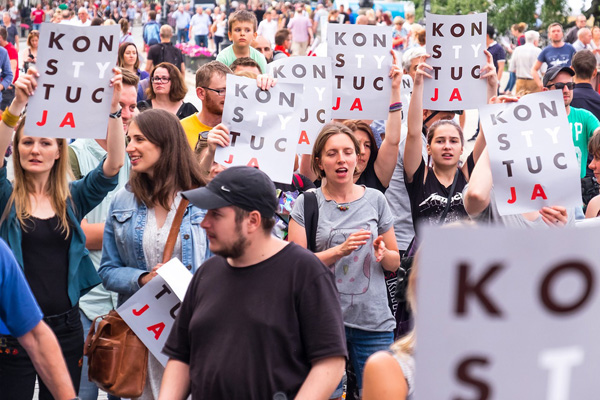
by Stuart Casey-Maslen
Editor’s note from Ryan Goodman: Just Security is publishing a mini-forum on a significant document being drafted by the United Nations Human Rights Committee concerning the right of peaceful assembly. We were honored to launch the series with an initial article by Christof Heyns, member of the Committee and its rapporteur on the draft General Comment. As Heyns noted in his article, the Committee is currently accepting public views on the draft document, and we hope this series at Just Security will contribute to the important work of the Committee.
The Human Rights Committee recently issued a first public draft of its next General Comment (No. 37) on the right of peaceful assembly, as protected under Article 21 of the International Covenant on Civil and Political Rights (ICCPR). The Committee has asked for public comments before they finalize the document in 2020. This is an important opportunity. Public comments have often affected the final version of the text of General Comments.
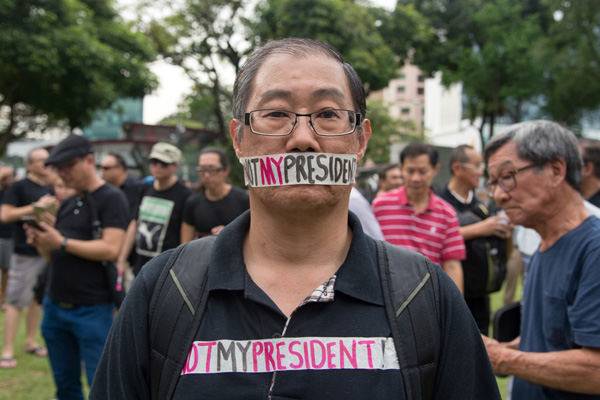
by Gerald Neuman
Editor’s note from Ryan Goodman: Just Security is publishing a mini-forum on a significant document being drafted by the United Nations Human Rights Committee concerning the right of peaceful assembly. We were honored to launch the series with an initial article by Christof Heyns, member of the Committee and its rapporteur on the draft General Comment. As Heyns noted in his article, the Committee is currently accepting public views on the draft document, and we hope this series at Just Security will contribute to the important work of the Committee.
The Human Rights Committee’s Draft General Comment 37 on freedom of assembly is an important contribution to the protection of a right that is very much under threat these days. The Committee has long been conscious of the need to address Article 21 of the International Covenant on Civil and Political Rights (ICCPR). The Rapporteur’s initial version and the Committee’s first reading Draft are an excellent start. Now that the Draft is open for comment, it is to be hoped that states and other stakeholders will provide useful input, particularly on practical issues about reconciling the right of peaceful assembly with the rights of others.
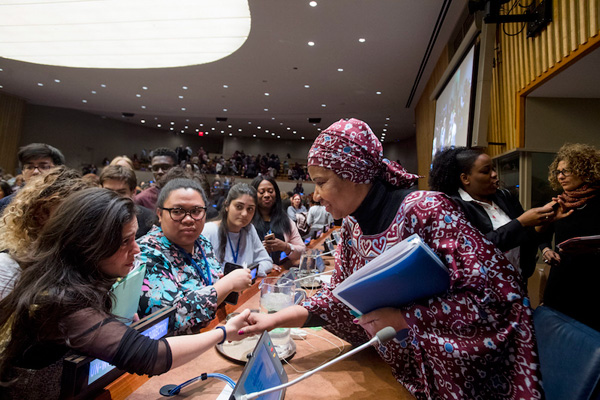
By: Christof Heyns & Frans Viljoen
February 11, 2020
A new, global academic study to answer this question is launched in collaboration with the UN High Commissioner for Human Rights.
The UN treaty bodies system has operated for the last more than half a century on the premise that it makes a difference where it matters: on the ground, in all countries around the world. Yet there is very little evidence available of the extent to which it actually makes such a difference, and why. It is hard to see how the system can survive—or for that matter be reformed, or even understood—without a much clearer picture of its impact and the forces that drive it.
An comprehensive research project on the impact of the treaty system, which started some years ago, is now being expanded into a global study aimed at filling this gap


